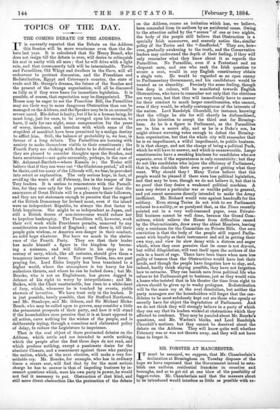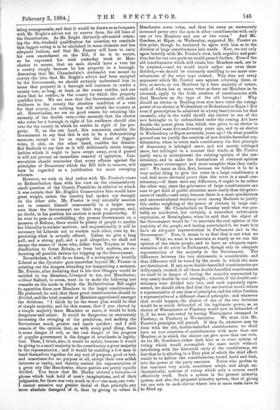MR. FORSTER AT MANCHESTER.
IT must be assumed, we suppose, that Mr. Chamberlain's declaration at Birmingham on Tuesday disposes of the hope we have expressed that the Government intend to esta- blish one uniform residential franchise in counties and boroughs, and so to get rid at one blow of the possibility of faggot-votes. Mr. Chamberlain said that the measure about to be introduced would interfere as little as possible with ex- isting arrangements, and that it would be drawn so as to square with Mr. Bright's advice not to swerve from the old lines of the Constitution. As Mr. Bright distinctly advocated retain- ing the 40s.-freehold qualification for counties, we conclude that faggot-voting is to be abolished in some clumsier and less adequate fashion and that Mr. Forster will have to carry his own amendment on the Bill, if he is to secure, as he expressed his wish yesterday week at Man- chester to secure, that no man should have a vote for a county simply because he has property in a borough. Assuming that Mr. Chamberlain's statement was meant to convey the idea that Mr. Bright's advice had been accepted by the Government, we should certainly understand him to mean that property in a borough will continue to confer a county vote, so long, at least, as the owner resides, and can show that he resides, in the county for which this property qualifies him. We are sure that the Government will make residence in the county the absolute condition of a vote for that county, for nothing less will satisfy the country at all. Nevertheless, we see no good reason for retaining the anomaly of the double vote,—the anomaly that the elector who votes for a borough in right of his residence, should also vote for the county in which he resides in right of his pro- perty. If, on the one hand, this concession enables the Government to say that this is not to be a disfranchising measure, except so far as regards the abuse of faggot. votes, it also, on the other hand, enables the dissatis- fied Radicals to say that as it will deliberately retain irregu- larities which it ought to have swept away, even if passed it will not prevent an immediate renewal of agitation. Con- servatives should remember that every offence against the principles of Democracy which the Bill fails to remove, will soon be regarded as a justification for more sweeping schemes.
However, we wish to deal rather with Mr. Forster's views on Redistribution than with his view on the comparatively small question of the County Franchise, in relation to which it was certain that Mr. Bright's Conservative bias would have great weight, unless the country had spoken out strongly on the other side. Mr. Forster is very naturally anxious not to commit himself unnecessarily to a larger mea- sure than the Government see their way to propose' and, no doubt, in his position his caution is most praiseworthy. If he were to pose as overbidding the present Government on a measure of Reform, there would be plenty of people to ascribe his liberality to sinister motives ; and unquestionably it will be necessary for Liberals not to weaken each other, even by de- preciating what is actually offered. Unless we give a long pull, and a strong pull, and a pull altogether, we shall not escape the snares of those who, either from Toryism or from disaffection to Great Britain, or from both motives, are ex- hausting all possible devices for tripping up the Government.
Nevertheless, it will do no harm, if a newspaper so heartily Liberal as the Spectator goes somewhat beyond Mr. Forster in pointing out the dangers attending too temporising a measure. Mr. Forster, after declaring that in his view Glasgow would be entitled to ten Members, Liverpool to ten, and Manchester, without Salford, to seven, went on to make the following just remarks on the mode in which the Redistribution Bill ought to apportion these new Members to the larger constituencies. He preferred, he said, that these great constituencies should be divided, and the total number of Members apportioned amongst the divisions. "I think by far the worst plan would be that of simple majority, and for this reason, that if you elected by a simple majority three Members or more, it would be both dangerous and unfair. It would be dangerous, as enormously increasing the swinging of the pendulum, and making the
fluctuations much greater and much quicker' and I still
remain of the opinion that, as with every good thing, there is some danger of evil, so the real danger of the progress
of popular government is the danger of over-haste in legisla-
tion. Then, I think, also, it would be unfair, because it would be giving to a small majority in the constituency a great majority in the representation ; and it would be enabling a few men to band themselves together for any sort of purpose, good or bad, and sometimes for no purpose at all, except their own selfish interests or vanity, and thereby control the representation of a great city like Manchester, where parties are pretty equally divided. You know that Mr. Morley uttered a formula—a
phrase which took. hold of men's imaginations, and of their judgments, for there was very much in it-6 one man, one vote.' I cannot conceive any greater denial of , that principle, any more absolute disregard of it, than by giving to voters in Manchester seven votes, and thus far away an enormously increased power over the men in other constituencies with only one or two Members and one or two votes." And Mr. Goschen, at Ripon on Wednesday, supported Mr. Forster on this point, though he hesitated to agree with him as to the division of large constituencies into wards. Now, we not only agree heartily with Mr. Forster's view, both negative and posi- tive, but for our own parts we would press it further. Even if the old constituencies which still retain two Members each, are to be retained,—and we would much rather see even these divided,—we should be extremely unwilling to see more con- stituencies of the same type created. Why does not every argument which Mr. Forster uses against returning three, or five, or seven, or ten Members by a bare majority of voters, each of whom has as many votes as there are Members to be returned, apply to the fresh creation of constituencies with dual Members on the type of the old boroughs? Why should an elector in Reading even now have twice the voting power of an elector in Wednesbury or Birkenhead or Ripon ? But even if prescription be admitted as a (very lame) excuse for that anomaly, why in the world should any elector in one of the new boroughs to be enfranchised under the coming Act have double the power given him which was given to an elector in Birkenhead some five-and-twenty years ago, and to an elector in Wednesbury or Ripon seventeen years ago ? On what possible ground can we justify the creation of new double-barrelled con- stituencies, when in every such constituency the first principle of democracy is infringed anew, and not merely infringed anew, but infringed in a manner that tends, as Mr. Forster justly says, to misrepresent the existing opinion of the con- stituency, and to make the fluctuations of electoral opinion appear more extravagant and more complete than they really are ? We insist on this, first, because we believe it to be a very unfair thing to give the voter in a large constituency o vast deal more electoral power than the voter in a small con- stituency,—if there were any difference, it ought to be rather the other way, since the grievances of large constituencies are sure to get hold of public attention more easily than the griev- ances of small,—and next, because there is a most mischievous and unconstitutional tendency even among Radicals to justify this undue weighting of the power of electors in large con- stituencies. Mr. Chamberlain on Tuesday used what was pro- bably an accidental, but certainly a somewhat unfortunate expression, at Birmingham, when he said that the object of the Government would be "to ascertain the real opinion of the majority of the people, and having ascertained it, we want it to have an adequate representation in Parliament and in the Government." Now, it seems to us that that is not what we want. What we want is to ascertain as nearly as we can the opinion of the whole people, and to have an adequate repre- sentation of the whole in Parliament, though only an adequate representation of the majority in the Government. The difference between the two statements is considerable, and that difference will be tested by the mode in which the seats are distributed. If any more double-barrelled constituencies are deliberately created, in all those double-barrelled constituencies we shall be in danger of having the majority represented by very nearly double its real strength ; whereas, if the double con- stituency were divided into two, and each separately repre- sented, we should often find that the one fraction would return a representative of one class of principles, and the other fraction a representative of a different class of principles ; and wherever that would happen, the elector of one of the two divisions would be as much defrauded of his legitimate power, as an elector of Westminster or Finsbury would now be defrauded of
it, if he were out-voted by having Westminster swamped in Finsbury, or Finsbury in WeAminster. We trust that Mr. Forster's principles will prevail. If they do, whatever may be done with the old, double-barrelled constituencies, we shall have no new creations of constituencies with more than one Member, or in which the elector can give more than one vote. As for Mr. Goschen's rather dark hint as to some system of voting which would accomplish the same result without interfering with the historical unity of the constituency, we
fear that he is alluding to a Tory plan of which the chief effect would be to deliver the constituencies, bound hand and foot,
into the power of the party caucuses. Tories who profess to fear caucuses very much, sometimes adopt, and adopt en- thusiastically, systems of voting which only a caucus could
effectively work. Such a system is the present minority system, and also the proposed minority system, that of giving but one vote to each elector where two or more seats have to be filled up.



































 Previous page
Previous page